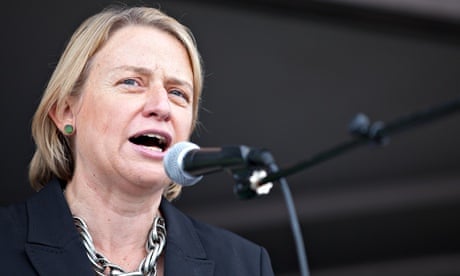The Green leader, Natalie Bennett, would decline to describe her party as the "Ukip of the left" but she does agree with Nigel on one thing: "The political class does not look like, sound like or have the life experiences of most people in Britain. The political class is not representing us. They are right about that," she said.
This was far from the only echo of Farage's anti-establishment anger, repackaged for the disillusioned left, to be heard at the Green party conference in Birmingham on Friday.
A fiery opening speech from Bennett was shot through with jibes about the wealthy Westminster elite, rallying calls to frustrated voters and attacks on the three major parties for offering more of the same.
Climate change got a few mentions, but the big cheers were for renationalisation of the railways, a minimum wage of £10 an hour, the abolition of profit-making in the NHS, a wealth tax, no more student fees and an end to the badger cull. The applause got even louder as she condemned the "deeply damaging Thatcherite" policies that she says have created a broken economic model for Britain.
In the past, Bennett has been coy about positioning her party on the political spectrum but this year she is firm. The Greens are "very much to the left" of Labour and the Lib Dems. And if she had to pick the next prime minister from the current feasible options, it would definitely be "Ed Miliband, with a sigh", she said.
Her attempts to become the favoured party of protest for leftwingers who feel betrayed by the last Labour government or by Nick Clegg's role in this one seems to be having some modest success.
The Greens are polling around 6%-8%, snapping at the heels of the Liberal Democrats, whom they beat in the European elections. The party's membership is up almost a third this year and it is fielding a record number of candidates in 2015 – in three out of every four seats.
And although Caroline Lucas, the party's only MP, faces a struggle to retain her seat in Brighton Pavilion, Bennett said she is optimistic about the Greens' chances in Liberal Democrat areas including Bristol, Solihull and Norwich.
The mood of the conference seemed more upbeat than last year, when there was discord over Green-led Brighton council's decision to slash the salary of rubbish collectors.
However, like many a small party, it is still riven with infighting and factionalism. The Watermelons – green on the outside, red on the inside – are delighted at what they perceive as a swing to the left.
But they are suspicious of the Kiwis and Limes group – green on the outside, green on the inside – who were sitting across the exhibition hall with bowls of fruit, and who want to keep the focus on the environment.
Thomas Jackson, who describes himself as a "devoted" member, has even booked his own stand to warn his party that they are failing to convey their message on climate change. He says the Greens are "hopeless" and "feeble" about warning people of the threat of catastrophe and wants to see his party "grasp the issue by the throat" much more.
However, Bennett believes her strategy of broadening the party's appeal is paying off. She dismissed worries about the Greens' financial credibility by arguing that the traditional governing parties have not proved they can do any better.
"We have got a huge political space available to us," she says. "This general election is unlike any other because we are a parliamentary party. Before we were always vulnerable to people saying Greens don't get elected to Westminster. They can't say we're irrelevant any more."

Comments (…)
Sign in or create your Guardian account to join the discussion